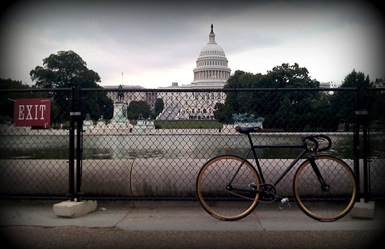
If there are two things I love, it’s markets and technology and I’ve noticed both at work in the district when it comes to parking and driving enforcement. Ever since the housing and nightlife market exploded in DC, the city has been making a killing on parking and driving violations. In fiscal year 2009 alone, 2.4 million tickets were issued. To give perspective on the lucrativeness of this number, if all 2.4 million tickets issued were at the minimum fine of $15 and went uncontested and paid, the district had the potential to reap in $36 million dollars and since upping the fines in June 2010, the number is now much higher.
Much of DC’s enforcement boom has come in part of technology. Traffic cameras are recording those of us driving over the speed limit and running orange lights, parking meters now accept credit cards, and parking officials (25% more have been employed by the district this year) are armed with handheld systems with built-in cameras that record license tags and remember parking histories.
Which has happened to me on several occasions and is why I made the decision to temporarily give up my car. I got sick of spending time and money on having a car in the district and it’s is a perfect example of how markets are supposed to work. The demand for resources, in this case parking, goes up, so the price goes up. And then new markets emerge. In this case, biking. Kudos to former mayor Adrian Fenty for his efforts to promote and support this. But with Fenty gone, his initiatives like the Capital Bikeshare program and bike lane expansion pilot are a waste if not fully implemented. Any resources dedicated to biking without the infrastructure to support them are made in vain and the reality is biking lanes in the city are too sporadic to be impactful. It’s a shame because with over 30% of DC residents not owning a car, that leaves many opting for the bus or metro without gaining the health benefits of any physical exercise. Did I mention DC ranks #1 in the country for having the highest medical costs of obesity, per capita, in the country?
My experience of biking as my go-to transportation has been, in a word, awesome. I don’t have to wait to get on my bike (I can’t say the same for the metro, bus or cabs), I always find parking, literally steps away (or sometimes inside) of my destination, I never get ticketed, I have an easy excuse not to go to events not bikeable to me and I get places a lot faster than by cab, metro, car or walking. One of the best aspects of my pro-cycling life, however, has been the physical and mental benefits of getting a workout without thinking about it and not waiting in traffic or for an unpredictable metro car.
If DC truly wants to be a world leader, it will help move us off our addiction of cars, which are an archaic and inefficient technology and unilaterally decrease the value and experience of the city. Everyone can agree that DC already has a bad enough climate in the summer with its ungodly heat and humidity; the last thing it needs is a growing exhaust-producing automotive population adding to the agony.
The bottom line and what Fenty recognized is a bike-friendly culture improves the quality of life for inhabitants of all economics means, it encourages more people to spend their dollars here (both residents and tourists), and it fosters a sense of community that’s virtually impossible to achieve in an automobile-based society.
Until transporters become a reality, biking has my vote for the best way to get around the city. If you agree, you can let the district know by voting at the OneCity Forum (an innovative campaign by iStrategyLabs to enable collaborative approaches to addressing the city’s greatest challenges).
2 things come to my mind:
(1) the handheld devices that the meter maids have also print out too, making them like invisible parking bandits. They can swipe in ticket/print/dashboard and then walk away. Seriously, every time I park I look around for one. Only a few times have I spotted them. Once I even tailed one. This lady was wearing dark clothes, darting in and out of the walkway, she was sophisticated in her sleuth-iness.
(2) cities are known to be about 10 degrees hotter than suburbs and rural areas. Cars are notorious heat producers in the summer (nothing worse than a blazing hot engine getting even hotter to cool the person 2 behind it). I wonder how less cars could cool the city? At the very least the city will be cleaner and nicer without all the honking, oil stains, and rubber particles.